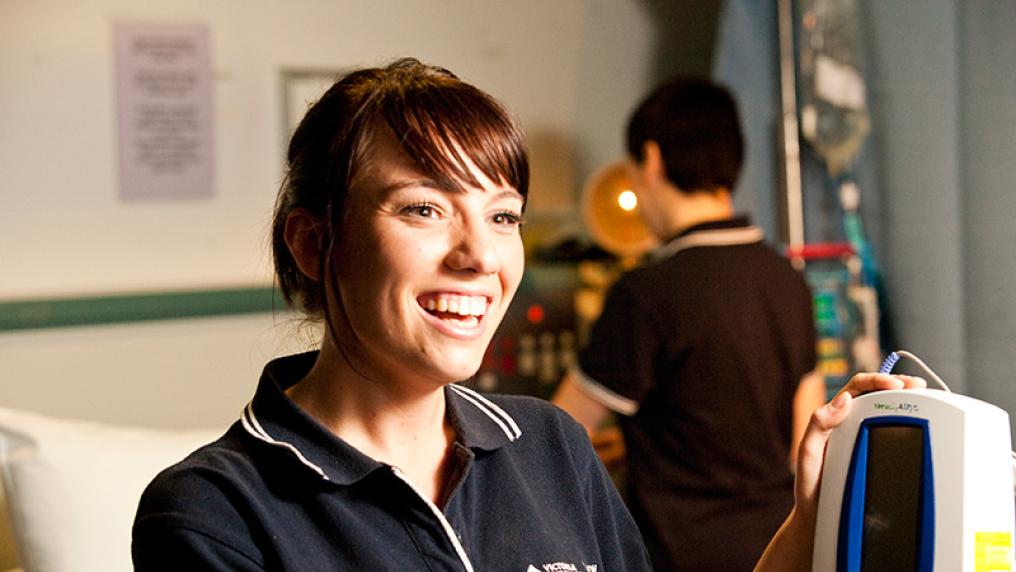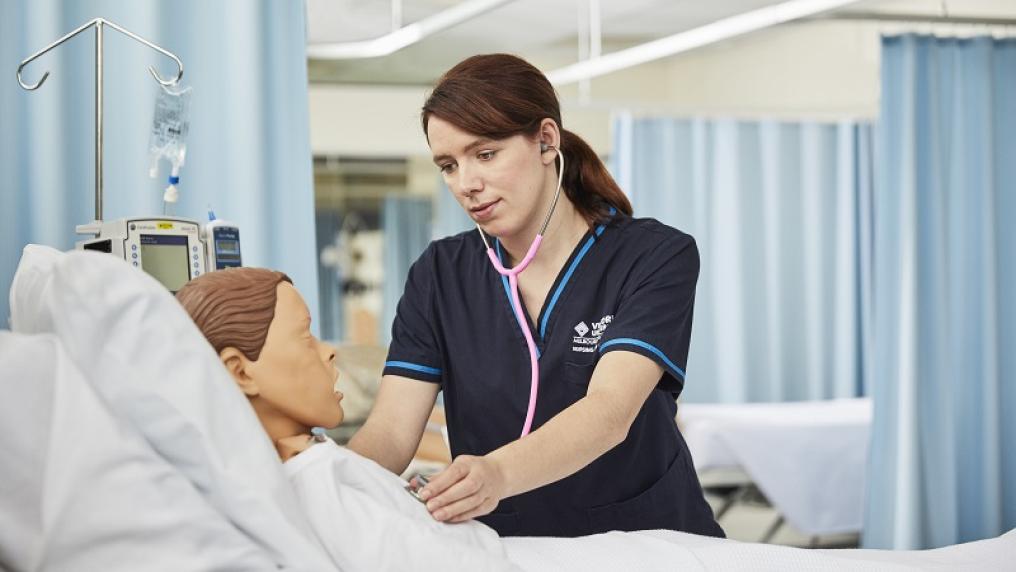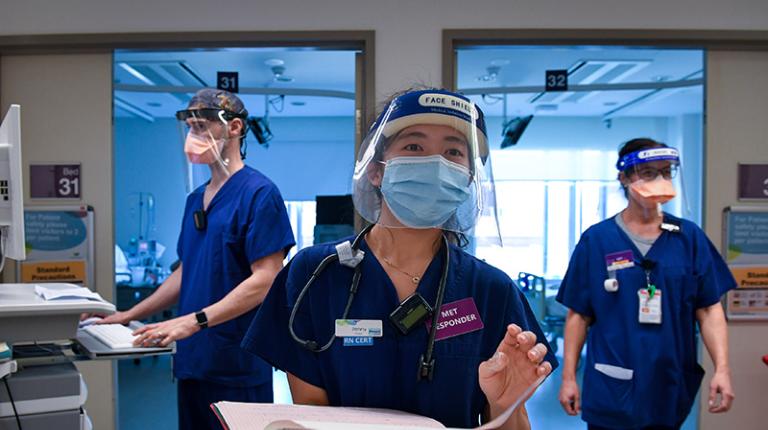Minimum entry criteria include:
- English-language requirements
- academic requirements.
Your work and life experience will also be considered.
To find specific entry requirements for this course, please select the section below that is most relevant to you.
Meeting the minimum entry criteria does not guarantee entry into this course.
This information is relevant if, in the 2 years prior to studying with us, you have completed (or will complete) one of the following:
- Australian Senior Secondary Certificate (e.g. VCE)
- an Australian or overseas equivalent to VCE
- an International Baccalaureate (IB).
Admission criteria
Completion of an Australian Senior Secondary Certificate (VCE or equivalent) including Units 3 and 4: a study score of at least 30 in English (EAL) or 25 in any other English.
AND
Units 3 and 4: a study score of at least 20 in one of Biology, Chemistry, Health and Human Development, any Mathematics or Psychology.
Please ALSO refer to ADDITIONAL INFORMATION section regarding English language skills registration standard for domestic students.This information is relevant if you have completed an accredited award (such as a certificate or diploma) at an Australian Registered Training Organisation (usually a TAFE, polytechnic or other registered VET institute).
Admission criteria
Completion of an Australian Advanced Diploma or Diploma (or equivalent) in Nursing, Health Sciences or similar.
Please ALSO refer to ADDITIONAL INFORMATION section regarding English language skills registration standard for domestic students.This information is relevant if you’ve previously completed all or part of a university or other higher-education course.
Admission criteria
Completed at least one semester of an Australian Higher Education award (or equivalent) in a Health Sciences related discipline.
Please ALSO refer to ADDITIONAL INFORMATION section regarding English language skills registration standard for domestic students.This information is relevant if you left secondary school more than two years ago and haven’t studied since.
Admission criteria
Completion of an Australian Senior Secondary Certificate (VCE or equivalent) more than two years ago including Units 3 and 4: a study score of at least 30 in English (EAL) or 25 in any other English.
AND
Units 3 and 4: a study score of at least 20 in one of Biology, Chemistry, Health And Human Development, any Mathematics or Psychology.
Please ALSO refer to ADDITIONAL INFORMATION section regarding English language skills registration standard for domestic students.Take a look at a student profile to get an overview of students who have previously enrolled in this course.
Applicant background Number of students Percentage of all students (A) Past Higher Education Study
(includes a bridging or enabling course)97 25.0% (B) Past vocational education and training (VET) study 88 22.7% (C) Recent secondary education Admitted solely on the basis of ATAR
(regardless of whether this includes the impact of adjustment factors such as equity or subject bonus points)38 9.8% (C) Recent secondary education Admitted where both ATAR and additional criteria were considered
(e.g. portfolio, audition, extra test, early offer conditional on minimum ATAR)11 2.8% (C) Recent secondary education Admitted on the basis of other criteria only and ATAR was not a factor
(e.g. special consideration alone, audition alone, schools recommendation scheme with no minimum ATAR requirement)9 2.3% (D) Work and Life experience 12 3.1% International students 133 34.3% All students 388 100% "<5" – the number of students is less than 5.
N/A – Students not accepted in this category.
N/P – Not published: the number is hidden to prevent calculation of numbers in cells with less than 5 students.
Special entry programs
Special admission programs
If you are from a disadvantaged or underrepresented social, economic or cultural background, you may be eligible for one of our special admission programs. These programs are designed to help you access education more easily.
Learn more about special admission programs
VU Early Entry
If you're currently in Year 11 or 12, our exclusive VU Early Entry program comes with a Conditional Offer to the course of your choosing*, a personalised course plan, special events, exclusive discounts and access to one-on-one course advice.
*Conditions apply.
Learn more about VU Early Entry
Inherent requirements
Inherent requirements are the abilities, attributes, skills and behaviours needed to meet the learning outcomes of the course.
You should carefully consider the inherent requirement statement as a:
- guide for your learning during the course
- way for you to identify challenges you may have in studying this course.
Additional information
Students must have successfully completed and submitted all mandatory documentation onto VU WIL at least two weeks prior to the commencement of the block to remain enrolled in HNB1205 Foundations in Nursing 2. Students who have not successfully submitted documentation, will be withdrawn from HNB1205.
Evidence of mandatory documents and vaccinations for placement is a hurdle for specific units in year 2 and year 3. Students must provide evidence of achievement of the required vaccinations and documents by 5pm on Friday of Week 3 of the Block in order to be eligible to pass the unit and to go on placement. Evidence of annual flu vaccination is also required (subject to availability).
ADDITIONAL INFORMATION FOR ALL DOMESTIC STUDENTS ON NURSING AND MIDWIFERY BOARD OF AUSTRALIA (NMBA) ENGLISH LANGUAGE SKILLS REGISTRATION STANDARDS
Applicants must be able to demonstrate that they meet the requirements of the Nursing and Midwifery Board of Australia’s (NMBA) English language skills registration standard. Proof of this English language competency can be achieved via ONE of the following three pathways:
Primary Language Pathway
Applicants must be able to demonstrate that their primary language is English and they have satisfactorily completed at least six years of primary and secondary education taught and assessed in English in either Australia, Canada, New Zealand, Republic of Ireland, South Africa, United Kingdom or United States of America, including at least two years between years 7 and 12.
Extended Education Pathway
Applicants must be able to demonstrate that they have satisfactorily completed three years (full-time equivalent) of education taught and assessed in English, in either Australia, Canada, New Zealand, Republic of Ireland, South Africa, United Kingdom or United States of America.
Note: It is a requirement of the NMBA English language skills registration standard, for registration as an Enrolled Nurse via this pathway, that five years (full-time equivalent) continuous education in total is completed.
English Language Test Pathway
Applicants must be able to demonstrate that they have achieved the required minimum scores in one of the following English language tests and meet the requirements for test results specified in NMBA’s English language skills registration standard:
• IELTS (Academic): minimum overall band of 7.0 (with no individual band less than 7.0 in reading, listening and speaking and no less than 6.5 in the writing band); OR
OR
• OET with a minimum score of B in each of the three components (listening, reading, and speaking) and a minimum score of C+ in the writing component.
OR
• PTE Academic with a minimum overall score of 66 and a minimum score of 66 in each of the three communicative skills (listening, reading, and speaking) and a minimum score of 56 in the writing communicative skill.
OR
• TOEFL iBT with a minimum total score of 94 and the following minimum score in each section of the test: 24 for listening, 24 for reading, 24 for writing, and 23 for speaking.
OR
Cambridge (C1 Advanced or C2 Proficiency) Minimum overall score of 185 in each of the three components (listening, reading, speaking) and minimum score of 176 in the one component of writing.
Applicants can obtain further information about the Standard at: http://www.nursingmidwiferyboard.gov.au/Registration-Standards/English-language-skills.aspx








